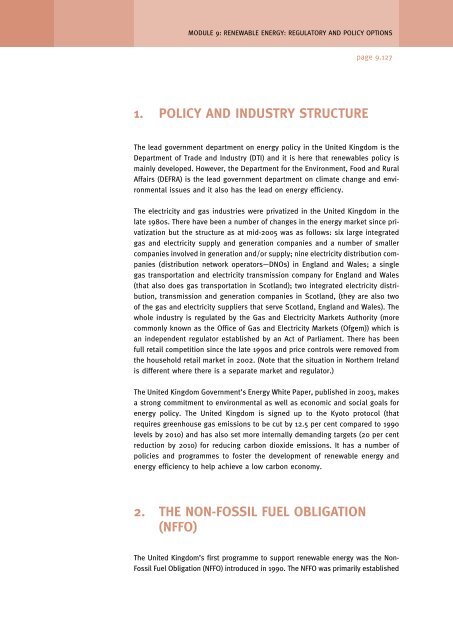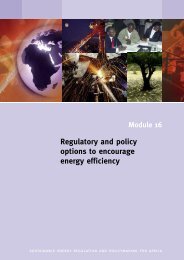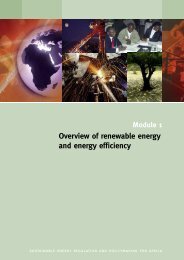Regulatory and policy options to encourage development of ...
Regulatory and policy options to encourage development of ...
Regulatory and policy options to encourage development of ...
- No tags were found...
Create successful ePaper yourself
Turn your PDF publications into a flip-book with our unique Google optimized e-Paper software.
MODULE 9: RENEWABLE ENERGY: REGULATORY AND POLICY OPTIONSpage 9.1271. POLICY AND INDUSTRY STRUCTUREThe lead government department on energy <strong>policy</strong> in the United Kingdom is theDepartment <strong>of</strong> Trade <strong>and</strong> Industry (DTI) <strong>and</strong> it is here that renewables <strong>policy</strong> ismainly developed. However, the Department for the Environment, Food <strong>and</strong> RuralAffairs (DEFRA) is the lead government department on climate change <strong>and</strong> environmentalissues <strong>and</strong> it also has the lead on energy efficiency.The electricity <strong>and</strong> gas industries were privatized in the United Kingdom in thelate 1980s. There have been a number <strong>of</strong> changes in the energy market since privatizationbut the structure as at mid-2005 was as follows: six large integratedgas <strong>and</strong> electricity supply <strong>and</strong> generation companies <strong>and</strong> a number <strong>of</strong> smallercompanies involved in generation <strong>and</strong>/or supply; nine electricity distribution companies(distribution network opera<strong>to</strong>rs—DNOs) in Engl<strong>and</strong> <strong>and</strong> Wales; a singlegas transportation <strong>and</strong> electricity transmission company for Engl<strong>and</strong> <strong>and</strong> Wales(that also does gas transportation in Scotl<strong>and</strong>); two integrated electricity distribution,transmission <strong>and</strong> generation companies in Scotl<strong>and</strong>, (they are also two<strong>of</strong> the gas <strong>and</strong> electricity suppliers that serve Scotl<strong>and</strong>, Engl<strong>and</strong> <strong>and</strong> Wales). Thewhole industry is regulated by the Gas <strong>and</strong> Electricity Markets Authority (morecommonly known as the Office <strong>of</strong> Gas <strong>and</strong> Electricity Markets (Ofgem)) which isan independent regula<strong>to</strong>r established by an Act <strong>of</strong> Parliament. There has beenfull retail competition since the late 1990s <strong>and</strong> price controls were removed fromthe household retail market in 2002. (Note that the situation in Northern Irel<strong>and</strong>is different where there is a separate market <strong>and</strong> regula<strong>to</strong>r.)The United Kingdom Government’s Energy White Paper, published in 2003, makesa strong commitment <strong>to</strong> environmental as well as economic <strong>and</strong> social goals forenergy <strong>policy</strong>. The United Kingdom is signed up <strong>to</strong> the Kyo<strong>to</strong> pro<strong>to</strong>col (thatrequires greenhouse gas emissions <strong>to</strong> be cut by 12.5 per cent compared <strong>to</strong> 1990levels by 2010) <strong>and</strong> has also set more internally dem<strong>and</strong>ing targets (20 per centreduction by 2010) for reducing carbon dioxide emissions. It has a number <strong>of</strong>policies <strong>and</strong> programmes <strong>to</strong> foster the <strong>development</strong> <strong>of</strong> renewable energy <strong>and</strong>energy efficiency <strong>to</strong> help achieve a low carbon economy.2. THE NON-FOSSIL FUEL OBLIGATION(NFFO)The United Kingdom’s first programme <strong>to</strong> support renewable energy was the Non-Fossil Fuel Obligation (NFFO) introduced in 1990. The NFFO was primarily established










